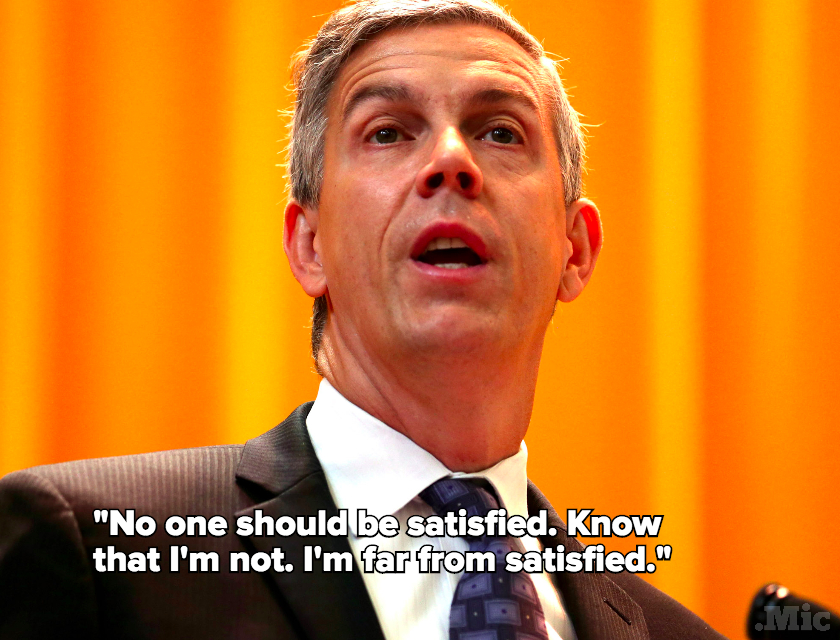The Exit Interview: Arne Duncan on His Legacy and the Future of Higher Education

Arne Duncan will go down as one of the most influential education secretaries in history.
Duncan, 51, will soon step down after serving for seven years as the United States secretary of education, making him one of President Barack Obama's longest-serving cabinet members and the second-longest-serving education secretary since the Department of Education was established in 1979.
During his time in office, Duncan has presided over an unprecedented growth of the size and scope of the federal government's role in K-12 education, enacting a $4.35 billion Race to the Top grant program that enticed states to enact a number of reforms, including performance-based pay for teachers and controversial Common Core standards for math and reading. On issues of higher education, Duncan's department has been similarly aggressive, overhauling the student loan industry, cracking down on for-profit colleges and combatting sexual assault on campus.
But that expansion of federal authority has come with its fair share of criticism, and Duncan is leaving office bruised by attacks from both the left and the right. In July 2014, delegates of the National Education Association, the largest teacher's union, called on Duncan to resign, citing his emphasis on school standards and standardized testing. Congress has taken steps to roll back many of the reforms Duncan has championed, and the House of Representatives recently votedto scale back the Education Department's authority over states and local school districts, with the Senate expected to do the same. On the campaign trail, Republican presidential candidates Sens. Marco Rubio of Florida and Rand Paul of Kentucky have called for eliminating the federal Education Department altogether.
With the education secretary's legacy on the line, Mic sat down with Duncan in the department's offices in downtown Chicago on a recent Friday afternoon for a wide-ranging conversation to take stock of his record, particularly on issues related to higher education. At 6'5'', Duncan is a towering presence with a warm personality and tendency to speak frankly.
Although he said he is proud of his accomplishments while in office, Duncan also said he is leaving unsatisfied, with parts of his ambitious agenda stymied by partisan politics. He has a run-through-the-doors attitude and bristles at what he sees as the glacial pace of change in Washington.
Asked to grade himself on how he has handled higher education issues, Duncan's answer was telling: "Incomplete."
"There's still so much further to go," he said. "No one should be satisfied. Know that I'm not. I'm far from satisfied."
The background: Duncan grew up in the Hyde Park neighborhood of Chicago's South Side. He graduated from Harvard University in 1987 and pursued a career as a professional basketball player with a four-year stint in Australia. In 1992, Duncan returned to Chicago to become the director of an education nonprofit focused on low-income students. It was during this time that he forged a unique bond with a little-known Illinois state senator named Barack Obama, a fellow hoops enthusiast. The two became close friends and regular partners in pick-up games.
Duncan was appointed CEO of Chicago Public Schools in 2001, a position he held until 2008. He said the experience profoundly shaped his view of the federal government's role in education.
"When I ran the Chicago public schools, the Department of Education was not always my friend," he said, recounting an episode in which he battled the department over cutting federal funding to an after-school tutoring program. "In fact, it rarely was. I went to Washington very skeptical about the federal government's role."
When Obama tapped Duncan as education secretary in 2008, Duncan suddenly found himself at the head of a department he had long viewed as unable or unwilling to pursue large-scale, meaningful change. But an influx of billions of dollars in education spending included in thestimulus package passed in 2009 gave Duncan unprecedented resources to implement reforms across the country.
He said that experience opened his eyes to what was possible with the resources and powers of the federal government at his disposal.
"Going in, if someone would have said, 'You can put $1 billion behind early childhood education. You can help encourage and incentivize 40-plus states to raise standards and think about setting assessments differently. You can put $40 billion into Pell grants without going back to taxpayers for a nickel,' I would've been like, 'I'm in! Can't be true,'" he said.
Early momentum eventually gave way to pitched battles over the department's newfound authority. Critics on the left and the right fault him for consolidating power over education policy in Washington, a criticism Duncan acknowledged, but flatly rejected.
"I think most of the critique we get is that we've done more than some folks would like," he said. "My dead honest critique of all of us, and I'll put myself at the top of the list, is we have not moved fast enough. There's a desperate need, and desperate urgency, and we don't act with that urgency."The Exit Interview: Arne Duncan on His Legacy and the Future of Higher Education - Yahoo News:

